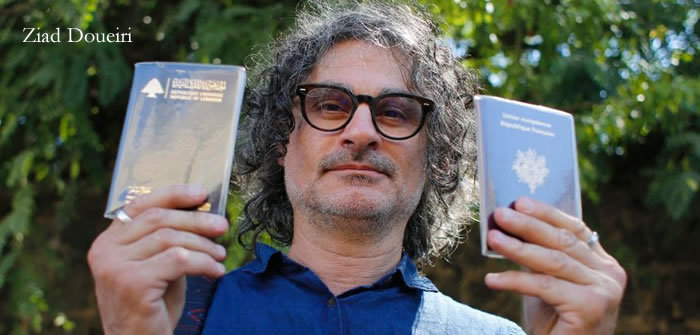 The American Cinematheque and the Consulate General and Promotion Center of the Argentine Republic in Los Angeles presented “Argentina: New Cinema ’09“, November 20-22 at The Egyptian Theatre. The seventh annual Argentine series showcased six films. This newer generation of Argentine directors is turning out polished thrillers and sophisticated romcoms. The opening night, hosted by activist and performer Nacha Guevara, featured Juan Jose Campanella’s stylish genre-bending thriller “The Secret In Their Eyes” (El secreto de sus ojos)
The American Cinematheque and the Consulate General and Promotion Center of the Argentine Republic in Los Angeles presented “Argentina: New Cinema ’09“, November 20-22 at The Egyptian Theatre. The seventh annual Argentine series showcased six films. This newer generation of Argentine directors is turning out polished thrillers and sophisticated romcoms. The opening night, hosted by activist and performer Nacha Guevara, featured Juan Jose Campanella’s stylish genre-bending thriller “The Secret In Their Eyes” (El secreto de sus ojos)
Writing with Eduardo Sacheri, Campanella (who shot many episodes of Argentina’s “Law and Order”) adapted Sacheri’s novel “La pregunta de sus ojos“. Working as both director and editor Campanella blends romance, psychological back stories, crime procedurals and comedy in a fluid complex thriller. Retired criminal-court employee Benjamin Esposito (Ricardo Darin) is writing a novel based on an unsolved murder-rape. He tells Judge Irene Hastings (Soledad Villamil), who is wary of lending her support.
Morales (Pablo Rago), the husband of the murdered woman, has spent years haunting the train stations watching for the murder. Two immigrant workers were railroaded for the murder, as flashbacks to the 70’s show. The flashbacks stir the political subtext and explain Irene’s initial reluctance to help Benjamin.
“Eye’s talk” claims Benjamin decoding the small eye movements and expressions that betray peoples’ secret. It’s a useful quality for a novelist, an investigator and a lover. 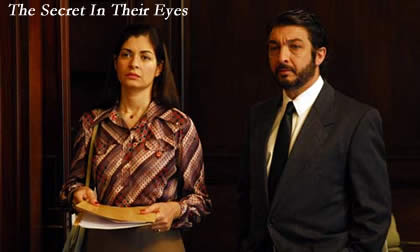
Irene and Benjamin are attracted to each other, and have been since the 80’s when she joined the department. But Benjamin is simply out classed, pining for the Cornell educated beauty married to a well -connected politico. Irene’s drawn in to helping him, as they argue about the power of memory, the major topic of a country with a buried ugly past. Playing Benjamin over a twenty-year span, Darin allows the frustrations of years, in a corrupt system, leak out of every pore. Javier Godino plays the assassin working for the secret police’s sanctioned death squad. Comic Guillermo Francella is memorable as Benjamin’s alchoholic buddy Pablo Sandoval.
Lucia Puenzo, whose first film “XXY“, won the 2007 Critics’ Week prize at Cannes, adapted her adolescent novel for film. The novel was narrated by a dog, a detail removed from the film to make it more mainstream. The privileged family of a well-connected judge (Pep Munne) lives in a gated villa in Buenos Aires. Globetrotting mom (Sandra Guida) flies to Paris for a marathon race. Dad gets threatening letters from political enemies and is holed up at home working on his memoirs. Son Nacho (Julián Doregger), a recovering druggie, prefers the rehab center in the country to his parent’s sybaritic household. Daughter Lala (Inés Efron- “XXY” “The Headless Woman “) is conducting a secret steamy romance with their Paraguayan maid. Mariela Vitale ( who studied Guarani to play the part) plays Ailín their ‘la Guayi’, the family’s term for an Indian live-in maid. Efron and Vitale shine in an ensemble of strong performances.
Ailín also sleeps with her old pal Pulido ( Javier Bardem’s brother Carlos Bardem) who lives in a warehouse and trains attack dogs for drug dealers and the police. Lala and Ailín plan to run away to her village in Paraguay. They’ve been systematically stealing art and jewelry, which they sell through Pulido to pay for a dream house they’re planning to build on the bank of Lake Ypoa.
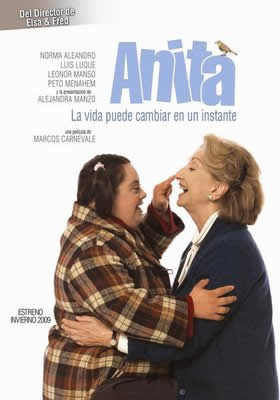 The lake is the home of the mythic Fish Child, a merboy who lives beneath the surface. Locals leave offerings, hug on branches of tree on the banks of the lake. The Fish Child cares for drowned babies, carrying them down to his waterly realm. An opening sequence, and an extended sequence where Lala swims with the Merboy create an oasis of Magical Realism. This moody sequence is an unfortunate counterpart to the sex and thriller scenes which suffer in comparison.
The lake is the home of the mythic Fish Child, a merboy who lives beneath the surface. Locals leave offerings, hug on branches of tree on the banks of the lake. The Fish Child cares for drowned babies, carrying them down to his waterly realm. An opening sequence, and an extended sequence where Lala swims with the Merboy create an oasis of Magical Realism. This moody sequence is an unfortunate counterpart to the sex and thriller scenes which suffer in comparison.
Lala spies on her father screwing her lover Ailín. Ailín’s been living with the family since she was thirteen. Has this abuse been going on all that time? An unfortunate series of events, including the mysterious murder of the Judge, blow the girls’ plan apart. Lala flees to Paraguay, where she meets Ailín’s father, estranged soap opera actor Socrates (Arnaldo Andre) and stays in their broken down house, discovering dark secrets about her lover. Ailin takes the heat for the Judge’s murder, winding up in a jail for juveniles. A gripping overwrought climax, involving an attempted escape from the Police Chief’s private brothel close the film. Alternating color palettes (DP Rolo Pulpeiro) and strong art direction (Mercedes Alfonsín) create three distinct environments. Editor Hugo Primero performs a yeoman’s task interweaving past and present.
“Anita” by Marcos Carnevale (“Elsa and Fred“) is an exceptional drama, based on accounts of a family that lived next to the bombed AMIA (Jewish Mutual Aid building in the Buenos Aires neighborhood of Once. Anita (Alejandra Manzo) lives with her mother Dora (consummate actress Norma Aleandro). Probably thirty, sweet Anita has Down Syndrome. Her brother Ariel (Peto Menahem) still plays with her like the little girl she’s remained. Her idea of a good time is a trip to the Zoo or the local pastry shop. One afternoon her mother goes to the AMIA to pick up Anita’s support check. She leaves Anita in charge of the family stationary shop, saying “when the two hands of the clock are there (I:00) I’ll be back”. Anita breaks one of her mother’s rules, she climbs a ladder. A sudden flash and a loud noise, when Anita comes to, the shop is a shambles, hit by shrapnel from the pipe bomb that destroyed the nearby center, killing many people in and near the building. Anita wanders through Buenos Aires. Her gentle spirit attracts several benefactors, though it soon becomes clear she’s their guardian angel rather than the other way around. First she winds up on the couch of a bitter divorced Ulises ( Luis Luque). Next she moves in with a lonely nurse Nora (Leonor Manso). Meanwhile Ariel’s been searching for her. A television newscast about the presumed missing, leads Nora to call Ariel.
The tone of this extraordinary film is that of a dark fable. Canevale is a humanist director, finding the good side of even dark characters.
Alejandra Manzo, the lead actress, has Down Syndrome. Manzo took the role to prove that actors with Down Syndrome could act. Alejandro is tone perfect as the over-protective Jewish mother, who has to care for a child into adulthood. An actress of great resource, her every mannerism adds levels to her quiet performance. She radiates her thoughts with the slightest change of expression. It’s a credit to Carnevale’s directing that the film never 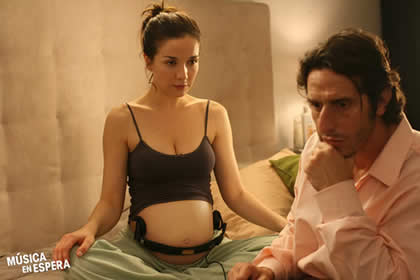 falters after Alejandro disappears from the story.
falters after Alejandro disappears from the story.
Hernan A. Goldfrid’s charming romantic comedy “Music on Hold” (Musica en espera), uses an answering machine “ringtone” as its McGuffin. Film composer Ezequiel (Diego Peretti-“La señal“) has landed an important commission but he’s suffering from composer’s block. His ex-wife’s giving him grief and he has twenty days to pay off the mortgage on his house. When he calls his bank manager, junior bank exec Paula (Natalia Oreiro) puts him on hold and he hears an inspiring piece of musak that seems to be the solution to his film score. He visits the bank trying to locate the crucial piece of musak. Two hapless security men tag him as a suspicious character. Using Paula’s name to gain access to the office floor. Ezequiel wanders around listening to phones, looking for his magic musak.
Pregnant and unmarried, Paula’s been lying to her parents in Madrid about a traveling boyfriend. Mom (Norma Aleandro) shows up in Buenos Aires unannounced to help her prepare for the birth. When security chases Ezequiel into Paula’s office, she introduces him to mom as her baby-daddy Santiago. While Paula engineers a way for him to check all the bank’s extensions, he plays prospective father. A smart ensemble piece with great performances and clever moments makes this an accomplished romcom. Expert comedienne Norma Aleandro details every moment. Daniel Burman and Diego Dubcovsky (“Derecho de familia”) produced. Guillermo Guareschi’s classical- inflected music pushes the film along.
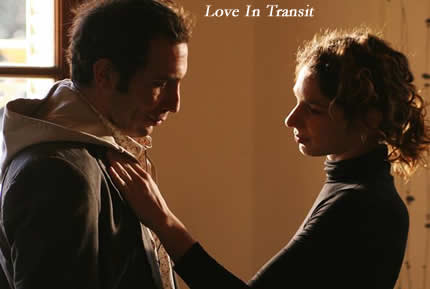 Lucas Blanco’s “Love In Transit” (Amor En Transito) is another look at love, but cunningly structured. Blanco plays with time. The identical opening and closing scene bracket a story of sudden encounters and missed connections. One love story is told in flashbacks, one is “flash-forwards”. Both stories intersect one day at the airport, a conceit revealed at the end. “Love in Transit” plays with the uncertainty of transient modern life, set against the economic troubles of Argentina, which led to wholesale emigration. Never discussed, the economic realities simmer subtextually.
Lucas Blanco’s “Love In Transit” (Amor En Transito) is another look at love, but cunningly structured. Blanco plays with time. The identical opening and closing scene bracket a story of sudden encounters and missed connections. One love story is told in flashbacks, one is “flash-forwards”. Both stories intersect one day at the airport, a conceit revealed at the end. “Love in Transit” plays with the uncertainty of transient modern life, set against the economic troubles of Argentina, which led to wholesale emigration. Never discussed, the economic realities simmer subtextually.
Mercedes (Damián Canduci) rushes to the Ezeiza International Airport, in a hurry to meet her fiancée in Barcelona. She bumps into Ariel (Lucas Crespi) a cool artist type, who invites her to a party. His house is the site of numerous farewell parties, as friend after friend emigrates from Argentina. Ariel maintains a map of the world, with picture of his friends pinned to their new global locations. The map functions as a metaphoric board game, a map of destiny. As Mercedes rushes towards the departure gate, Juan (Damián Canduci) returns from years abroad. He goes to his girlfriend’s apartment, but the super explains that’s she’s on a trip. He can’t answer if it’s a short trip or a trip abroad. Juan meets waitress Micaela (Verónica Pelaccini) and the sparks fly. Each couple embarks on a romance. Mercedes moves into Ariel’s place, warning him to enjoy the moment, she may leave at anytime. Their romance is sensual, playful. Juan and Micaela enjoy an earthy, practical alliance. Juan pines for his missing girlfriend but opens up to wary Micaela. As the film began, I was restless. The characters seemed slight and the constant close-ups unfocussed, but bit-by-bit the film bloomed, winning me over to the characters and wrapping up with a clever structural revelation.
Inés Braun’s low budget “Love by Accident” (La ronda) adapts the gimmick of Arthur Schnitzler’s “La Ronde“. As in the classic play, most famously filmed by Max Ophüls in the 1950’s, a series of love encounters or miss encounters are chained together in a circular structure. The story begins and ends in a neighborhood bar in San Telmo. Two waitresses lip-synch to a British pop song. Their avuncular boss lets Lucia (Sofia Gala Castiglione) off early to spend a weekend with her boyfriend Javier’s parents. But a cafe meeting makes it clear she’s crowding him, and in a trice, they’ve broken up. Javier, a realtor, meets his client Mónica (Mercedes Moran), a lookee-loo who visits houses as a form of voyeuristic amusement, pretending to be wealthy enough to rent them. Amorous Javier puts the make on her in one of the apartments. Drunk in the afternoon, Monica wanders off, grabbing a cab. Cab driver Luis is also a house  painter. Drunken Monica offers him a job. The next morning, bright and early, Luis shows up ready to go to work. Rafael Spregelburd is marvelous as the garrulous workman, who the lonely woman begins to rely on. Enjoying having a man around the house, Mónica begins to imagine he’s a permanent house guest. But oblivious Luis moves on once he’s finished his painting tasks.
painter. Drunken Monica offers him a job. The next morning, bright and early, Luis shows up ready to go to work. Rafael Spregelburd is marvelous as the garrulous workman, who the lonely woman begins to rely on. Enjoying having a man around the house, Mónica begins to imagine he’s a permanent house guest. But oblivious Luis moves on once he’s finished his painting tasks.
Stunning actress Julia (Leonora Balcarce) and her acting pals are passing out flyers for their arty theatre piece. They give Luis a flyer, which he mistakes for an invitation. A dinner out with her friends after the play, and he’s launched in the bohemian world, attending a cocktail at an important gallerist’s house gallery. Assuming Luis is an “art” painter Julia goes to dinner at his house. The amorous working man, who can’t believe his luck, fixes her dinner. Julia looks around, spots his housepainting tools, and ducks out. But Luis has been taken up by her boho friends, and the class difference is exploited for laughs. At the gallery, Julia meets and goes home with Max (Walter Jacob), a film director who gives her a part in his film, shooting at “La Ronde” bar, where Inés Braun creates an endearing surprise ending.
Series compiled by: Fernando Brun, Pablo Maseda and Gwen Deglise.

